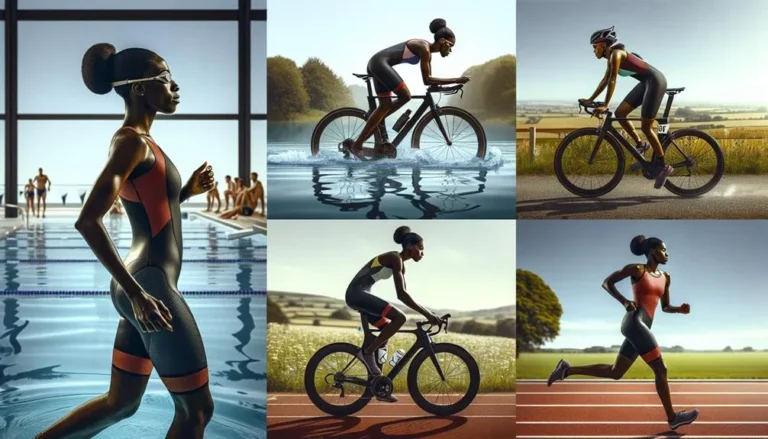Wondering what the best approach is to train effectively for a triathlon? It all starts with setting realistic training goals that align with your current fitness level and end objective.
But that's just the beginning. Structuring a well-rounded training plan that includes swim, bike, and run sessions is crucial. Yet, the secret lies in the details – incorporating cross-training activities, fine-tuning your nutritional strategies, and understanding the importance of recovery and rest days.
Each element plays a vital role in reaching your peak performance level.
Key Takeaways
- Set achievable goals and celebrate milestones for motivation and success.
- Structure a balanced training plan with gradual intensity increases and rest days.
- Incorporate cross-training activities to enhance overall performance and prevent injuries.
- Focus on nutritional strategies to support energy, muscle repair, and overall performance.
Setting Realistic Training Goals
Setting achievable training objectives is crucial for success in preparing for a triathlon. When I began my journey into triathlon training, I made the mistake of setting lofty goals without considering my current fitness level. It resulted in burnout and frustration. Through trial and error, I learned the importance of realistic goal-setting. By setting objectives that were challenging yet attainable, I found myself more motivated and consistent in my training.
One expert tip I received was to break down my ultimate goal of completing a triathlon into smaller, manageable milestones. For example, instead of aiming to run a full marathon immediately, I focused on increasing my running distance gradually. This approach not only prevented overwhelm but also allowed me to celebrate small victories along the way.
Structuring a Balanced Training Plan
When structuring a balanced training plan for a triathlon, the key is to consider the integration of various disciplines to optimize performance and prevent overtraining. It's crucial to strike a harmonious balance between swimming, cycling, and running sessions to ensure overall fitness and prevent burnout. Here are some essential tips to help you craft a well-rounded training plan:
- Progressive Overload: Gradually increase the intensity and duration of your workouts to challenge your body and improve your fitness levels.
- Rest and Recovery: Schedule rest days to allow your muscles to repair and prevent injuries. Recovery is just as important as training.
- Nutrition: Fuel your body with a balanced diet rich in carbohydrates, proteins, and healthy fats to support your training and enhance performance.
- Consistency: Stay consistent with your training schedule to build endurance and improve your overall performance on race day.
Incorporating Cross-Training Activities
Incorporating a diverse range of cross-training activities into your triathlon training regimen can significantly enhance your overall performance and reduce the risk of injury. Cross-training not only helps prevent overuse injuries by giving specific muscle groups a rest but also improves overall fitness by challenging your body in different ways.
Personally, I've found that incorporating activities like yoga, swimming, and cycling into my routine hasn't only kept me injury-free but has also enhanced my strength and endurance levels.
Focusing on Nutritional Strategies
Exploring the vital role of nutrition in optimizing triathlon performance reveals the significant impact dietary choices can have on an athlete's training, recovery, and overall success in the race.
When it comes to fueling your body for triathlon training, there are key strategies to consider:
- Balanced Macronutrients: Ensuring you have the right balance of carbohydrates, proteins, and fats can provide the energy needed for training sessions while supporting muscle repair and growth.
- Hydration: Proper hydration is crucial for maintaining performance and preventing fatigue. Electrolyte-rich drinks can be beneficial during longer training sessions.
- Pre-Workout Fuel: Consuming a mix of easily digestible carbohydrates and a small amount of protein before workouts can enhance performance and prevent muscle breakdown.
- Post-Workout Recovery: Refueling with a combination of protein and carbohydrates within 30 minutes of finishing a workout can aid in muscle recovery and replenish glycogen stores.
Implementing Recovery and Rest Days
Optimizing triathlon performance goes beyond just physical training and nutrition; a crucial aspect that often gets overlooked is the strategic implementation of recovery and rest days. As a triathlete, I've learned firsthand the importance of balancing intense workouts with adequate rest. Recovery days aren't just about lounging on the couch but are a strategic part of training that allows the body to repair and grow stronger.
Implementing recovery and rest days into your training plan is essential for preventing burnout and reducing the risk of injury. These days allow muscles to recover, repair, and become more resilient to the demands of triathlon training. It's during rest that the body adapts to the stress placed on it during workouts, leading to improved performance over time.
Neglecting rest and recovery can hinder progress and lead to overtraining. By incorporating these essential rest days into your routine, you'll not only see physical gains but also experience mental rejuvenation, ensuring you stay motivated and energized throughout your triathlon journey. Remember, rest isn't a sign of weakness but a vital component of a successful training program.
Conclusion
In conclusion, the key to successful triathlon training lies in setting realistic goals, structuring a balanced plan, incorporating cross-training, focusing on nutrition, and prioritizing recovery. By following these strategies, you can enhance your performance and achieve your personal best.
So, lace up your shoes, dive into the pool, and hit the pavement with confidence knowing that you're well-equipped to conquer the challenges of a triathlon. The journey to the finish line awaits… are you ready?
